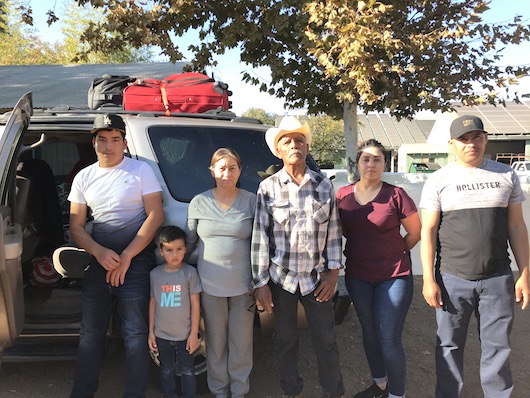
This family worked hard at Full Belly all spring and summer, and just left for Mexico —
We are still in the thick of our olive harvest but were not able to continue because of the power outages that started on Saturday 10/26. We take our olives directly to the mill for pressing because that is the way to get the best oil, but the Seka Hills Olive Mill will be without power and has told us that their doors will be shut, right in the middle of prime time. Another dimension of the problem is that stores have placed veggie orders, but when we arrive with the deliveries we are turned away because there is no power.
We know that many people are experiencing similar circumstances. Here at the Farm on Monday morning in addition to the power outage we have no phone service and limited internet because of a power line that went down in the Capay Valley on Saturday night. Our neighbors wrote an excellent piece in the New York Times that we would like to share, called What Does it Mean to Lose Power on a Farm? When the power is out there is no running water in most rural areas, creating vulnerability for livestock and of course grave concerns about farm coolers and freezers, often full of fruits and vegetables. Full Belly has several generators — enough to keep the packing shed (where our coolers and freezer are) and the office up and running when needed.
Our neighbors offer many suggestions in their short article, for example: “The most obvious solution would be for PG&E to bury electrical lines in rural areas. This would keep power flowing to farmers no matter the weather, while reducing the risk of wildfires.” Watching the PG&E crews pruning trees below the lines several times a year and installing new power poles every time someone runs their car into one has often made me wonder if it wouldn’t actually be a long term cost savings to bury the electrical lines.
The power outage is a mere inconvenience compared to the fire damage suffered by so many in both northern and southern California. We have family and many friends in the path of these fires, with emergency crews all over northern California stretched to the limit as we watch the wind seeming to rip the power lines to shreds in some areas. There are certainly some lessons for us Californians to learn about fire prevention and no single cause that explains the extremely dangerous nature of recent fires. Climate change is only one of the culprits. Right now, carbon dioxide is at its highest concentration in the atmosphere in three million years and climbing. The USDA has been routinely burying its work on climate change, and farmers and ranchers are increasingly dealing with its harmful effects, ferocious fires being only one of them. Greta Thunberg summed it up at the 2019 Climate Action Summit: “This is all wrong… Entire ecosystems are collapsing and all you can talk about is money and the imperative of eternal economic growth. How dare you?”
— Judith Redmond
